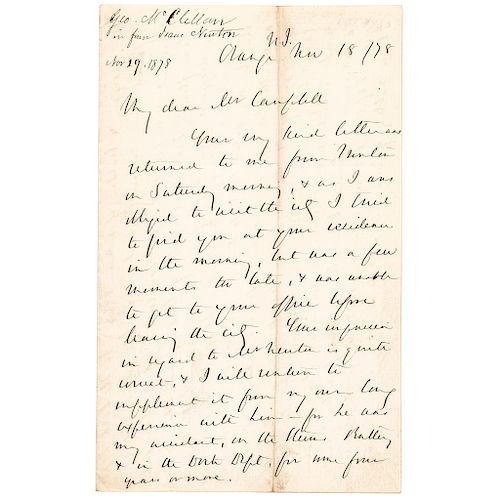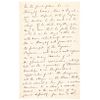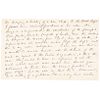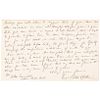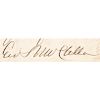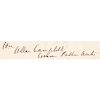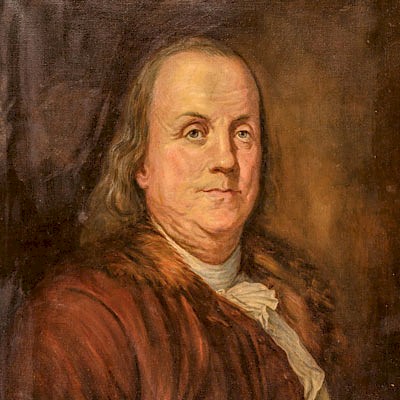1878 George B. McClellan Autograph Letter Signed as 24th Governor of New Jersey
Lot 61
Estimate:
$1,000 - $1,500
Absentee vs Live bid
Two ways to bid:
- Leave a max absentee bid and the platform will bid on your behalf up to your maximum bid during the live auction.
- Bid live during the auction and your bids will be submitted real-time to the auctioneer.
Bid Increments
| Price | Bid Increment |
|---|---|
| $0 | $10 |
| $200 | $20 |
| $300 | $25 |
| $500 | $50 |
| $1,000 | $100 |
| $2,000 | $200 |
| $3,000 | $250 |
| $5,000 | $500 |
| $10,000 | $1,000 |
| $20,000 | $2,000 |
| $30,000 | $2,500 |
| $50,000 | $5,000 |
| $100,000 | $10,000 |
| $200,000 | $20,000 |
| $300,000 | $25,000 |
| $500,000 | $50,000 |
About Auction
By Early American History Auctions
Aug 24, 2019
Set Reminder
2019-08-24 12:00:00
2019-08-24 12:00:00
America/New_York
Bidsquare
Bidsquare : Autographs, Colonial Currency, Political Americana, Historic Guns
https://www.bidsquare.com/auctions/early-american-history-auctions/autographs-colonial-currency-political-americana-historic-guns-4347
Historic Autographs • Colonial Currency • American Civil War Colonial Era • Revolutionary War • Political Americana • Black History Early American History Auctions auctions@earlyamerican.com
Historic Autographs • Colonial Currency • American Civil War Colonial Era • Revolutionary War • Political Americana • Black History Early American History Auctions auctions@earlyamerican.com
- Lot Description
Autographs
1878 George B McClellan Autograph Letter Signed While the 24th Governor of New Jersey Regarding Isaac Newton Jr
GEORGE B. MCCLELLAN (1826-1885). Also known as: "Little Mac" and "The Young Napoleon," American soldier, civil engineer, railroad executive, and politician. A graduate of West Point, McClellan served with distinction during the Mexican War (1846-1848), Civil War (1861-1865) McClellan was appointed Major General of the Army of the Potomac, and (November 1861 - March 1862) as General-in-Chief of the Union Army, 24th Governor of New Jersey, in office January 15, 1878 - January 18, 1881.
November 29, 1878-Dated, Autograph Letter Signed, "Geo B McClellan", while the 24th Governor of New Jersey, 4 pages, measuring 5" x 8", Orange, New Jersey, Choice Very Fine. This Letter is boldly written in rich brown ink on clean wove period paper to Honorable Allan Campbell, Commissioner of Public Works in New York. The content is concerning Isaac Newton, Jr. a noted engineer who served on the USS Monitor (see additional information online), specifically regarding "the designing & building of a new ship." Also noted at the top left of the first page "Geo. McClellan in favor Isaac Newton."
Accompanied by a 31 page copy of "Isaac Newton Jr. Family Papers" at The Mariners' Museum Library, recording a listing of 6 boxes and 1 oversize file folder, including correspondence,
photographs, 1 Carte de Visite, orders (military records), mortgages, contracts, pamphlets,
leaflets, forms (documents), periodicals, diaries, certificates, deeds, ephemera,
broadsides, sailing cards donated by the: Isaac Newton Jr. family.
George Brinton McClellan (December 3, 1826 - October 29, 1885) was an American soldier, civil engineer, railroad executive, and politician. A graduate of West Point, McClellan served with distinction during the Mexican War (1846-1848), and later left the Army to work in railroads until the outbreak of the Civil War (1861-1865).
Early in the war, McClellan was appointed to the rank of Major General and played an important role in raising a well-trained and organized army, which would become the Army of the Potomac in the Eastern Theater; he served a brief period (November 1861 to March 1862) as General-in-Chief of the Union Army.
Although McClellan was meticulous in his planning and preparations, these very characteristics hampered his ability to challenge aggressive opponents in a fast-moving battlefield environment. He chronically overestimated the strength of enemy units and was reluctant to apply principles of mass, frequently leaving large portions of his army unengaged at decisive points.
McClellan organized and led the Union army in the Peninsula Campaign in southeastern Virginia from March through July 1862. It was the first large-scale offensive in the Eastern Theater. Making an amphibious clockwise turning movement around the Confederate Army in northern Virginia, McClellan's forces turned west to move up the Virginia Peninsula, between the James and York Rivers, landing from the Chesapeake Bay, with the Confederate capital, Richmond, as their objective.
Initially, McClellan was somewhat successful against the equally cautious General Joseph E. Johnston, but the emergence of General Robert E. Lee to command the Army of Northern Virginia turned the subsequent Seven Days Battles into a partial Union defeat.
General McClellan failed to maintain the trust of President Abraham Lincoln. He did not trust his commander-in-chief and was privately derisive of him. He was removed from command in November after failing to decisively pursue Lee's Army following the tactically inconclusive but strategic Union victory at the Battle of Antietam outside Sharpsburg, Maryland, and never received another field command.
McClellan went on to become the unsuccessful Democratic Party nominee in the 1864 presidential election against Lincoln's reelection. The effectiveness of his campaign was damaged when he repudiated his party's platform, which promised an end to the war and negotiations with the southern Confederacy. He served as the 24th Governor of New Jersey from 1878 to 1881, and eventually became a writer, and vigorously defended his Civil War conduct.
Most modern authorities have assessed McClellan as a poor battlefield general. Some historians view him as a highly capable commander whose reputation suffered unfairly at the hands of pro-Lincoln partisans who made him a scapegoat for the Union's military setbacks. After the war, subsequent commanding general and 18th President Ulysses S. Grant was asked for his opinion of McClellan as a general; he replied, "McClellan is to me one of the mysteries of the war."
At the start of hostilities in the Civil War, Newton sought a commission with the United
States Navy. After passing his examinations, he was commissioned as First Assistant
Engineer, U.S. Navy, on June 14, 1861, and was ordered to report to the USS Roanoke.
He served on the Roanoke, under Chief Engineer Alban Stimers, as part of the Federal
blockade squadron off of Charleston Harbor. Newton was transferred from the Roanoke,
on November 20th, 1861, and in accord with John Ericsson and Alban Stimer?s wishes, he
was assigned to duties in connection with the construction of the USS Monitor. Upon the
ship?s completion in January 1862, Newton volunteered as First Assistant Engineer and
participated in her voyage from New York to Hampton Roads and subsequently in the
Monitor's historic confrontation with the Confederate ironclad CSS Virginia on March 9,
1862.
He remained on board Monitor until August 1862, when transferred to the Office of the
General Inspector of Ironclads, where he served as superintendent of construction.
During the next three years, Newton was involved in the construction and preparation of
plans and specifications for the construction of an Atlantic Coast ironclad fleet. On
February 8, 1865, he resigned his commission in the Navy and took charge, as engineer,
of the Broad Top Coal Company's Works (Kemble Coal and Iron Company).
By 1868, Newton was working with former general George McClellan reconstructing the Stevens Steam Battery at Hoboken. In June of 1869, the Secretary of the Navy appointed him to
a Navy board to examine the condition and needs of the steamships in the Navy. From
1871 to 1872, Newton was an assistant to McClellan in the Department of Docks of the City of New York.
Over the course of the next decade, Isaac Newton was engaged with the railways of
Prince Edward Island, U.S. Rolling Stock Company, Burlington and Southwestern
Railway, International Railways of Nova Scotia, and the New York Rapid Transit
Commission. He was a member of the United States Court of Claims in the Monitor
cases and was a trustee of the New York and Brooklyn Bridge. On March 3, 1880,
Newton was elected as a member of the American Society of Civil Engineers.
On March 15, 1881, Newton was appointed chief engineer of the Department of Public
Works of the City of New York.
As chief engineer for the department, Newton developed
and designed the Croton Aqueduct. Isaac Newton would not live to see the completion of
this project, as he died on September 25, 1884.
Isaac Newton Sr. was born January 16, 1794. His father, Abner Newton, is listed as a
Revolutionary War veteran from the colony of New York. Isaac Sr. is listed on several
documents as a merchant and ship master. A
- Shipping Info
-
Early American provides in-house worldwide shipping. Please contact us directly if you have questions about your specific shipping requirements.
-
- Buyer's Premium



 EUR
EUR CAD
CAD AUD
AUD GBP
GBP MXN
MXN HKD
HKD CNY
CNY MYR
MYR SEK
SEK SGD
SGD CHF
CHF THB
THB